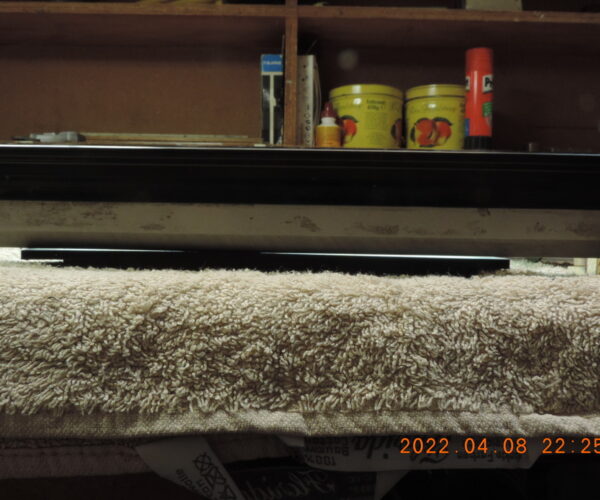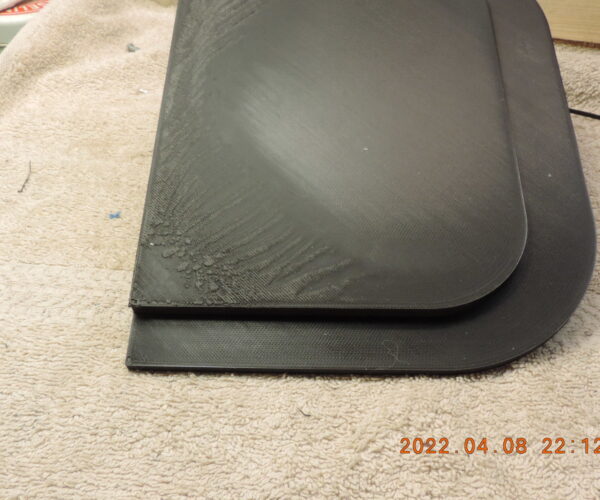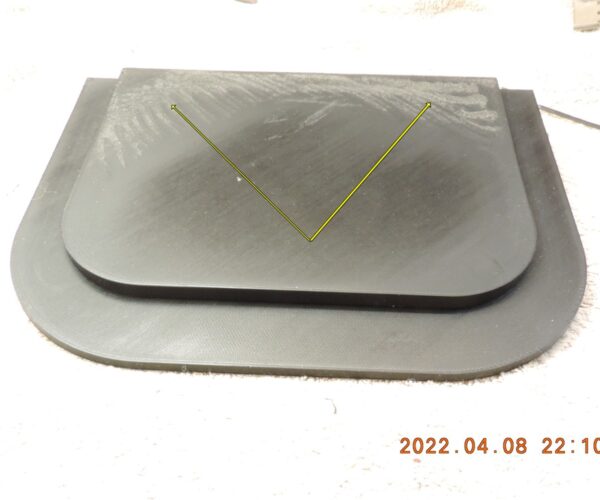Bottom deforms during printing creating rough surfaces on top layers
Hi all, I have a problem printing a 10 mm thick lid for a box where the dimensions of the lid are 200x160 mm, so relatively large for an MKS3+. Actually it is only a half lid. Printing with PLA went very bad (rough surface) from the beginning, probably because the printer had been displaced. So I did a new XYZ calibration and a first layer Z adjustment. That looked OK. I started the print (4h30m) and the first layers looked OK. In specific, the first layers were absolute flat on the bed. I watched it up, not continuously and everything went OK up to ~9 mm thickness. I left the printing process and when I came back the print was finished, temperatures were down, but the top layer was again rough mainly at the 90° edges. When I inspected the result I noted that the bottom (1st layer) wasn't flat anymore and with a straight edge I could see that the edges were more than 1 mm lower than the middle. That could explain the rough surface because if these edges would come up (suddenly) during the printing process, the nozzle will shear the surface. However I do not really understand why the lid would deform during the printing and mainly at this edge. Maybe this might be due to the temperature difference of the bottom (@60°C) compared to the top temperature, I would guess to be around room temperature. Maybe temperature difference bottom-top and thermal expansion plays a role. But if there are other suggestions, I would appreciate to hear them. Nevertheless I am considering to print it again and than to lower the bed plate temperature once the printing has reached Z=1 mm or so to room T and see if that would cure the problem.
I searched the forum but couldn't find a similar problem, or the correct search terms. Some photographs attached but note that I had already used a file to get off the major roughness when taking these pictures.
RE: Bottom deforms during printing creating rough surfaces on top layers
I searched the forum but couldn't find a similar problem, or the correct search terms.
The search term you're looking for is "warping".
It's common for large box-shaped/rectangular objects to warp. Assuming Live Z is well calibrated and the steel sheet is clean (using hot water and fragrant-free dish washing soap), here are a few approaches that have worked for me:
* Slow down print speed.
* Add Mickey Mouse ears to the corners. You can add a cylindrical part in PrusaSlicer, maybe 10mm diameter, change height to single layer height, then place the part at the corner. Repeat for each corner.
* Add a brim around the model, 5 mm or more. Wider or 2 -layer high brims may be needed but may not work with the size of the model or may require being added in your CAD software.
* Use Layerneer Bed Weld (< https://www.amazon.com/Printer-Adhesive-Layerneer-Original-Filament/dp/B079984GV5/> ). You only need a thin layer.
* If you have design control over your part and it's possible considering the intended use, you can try to round the edges and/or add holes to the base of the model.
* Combination of above. Usually, brim/ears does the job, or some Layerneer if needed, but large, rectangular objects can be a challenge.
Formerly known on this forum as @fuchsr -- https://foxrun3d.com/
RE: Bottom deforms during printing creating rough surfaces on top layers
Thanks, yes warping! I did another try this morning (before I saw your reply) and lowered the bed temperature @Z=1.4 mm to 40°C and @Z=3 mm to 35°C. And stopped the print @Z=4 mm (which is the thickness of the rim) because all around the rim was warped: I could easily put a 0.05 mm feeler below the rim for ~20 mm. Only the long straight edge was still flat and not warped. And started a next test, still before your reply, which is now running with glue from a glue stick (yes steel sheet washed, etc.) and if that fails I will go for the MM ears, etc. Thanks. But unfortunately on Amazon: "Currently unavailable. We don't know when or if this item will be back in stock." Btw real holes are not possible, the lids are an anti-real-mouse protection.
RE: Bottom deforms during printing creating rough surfaces on top layers
Yesterday my glue stick print finished OK, everything flat, no roughness, a clean print. The glue has some impact on the esthetics of the bottom layer (which is the top of the lid), but this is just a utility item. In addition to the glue, just before the top layer started @Z=9 mm, I decreased the speed to 70%. Again many thanks for the comments and clarifications.


